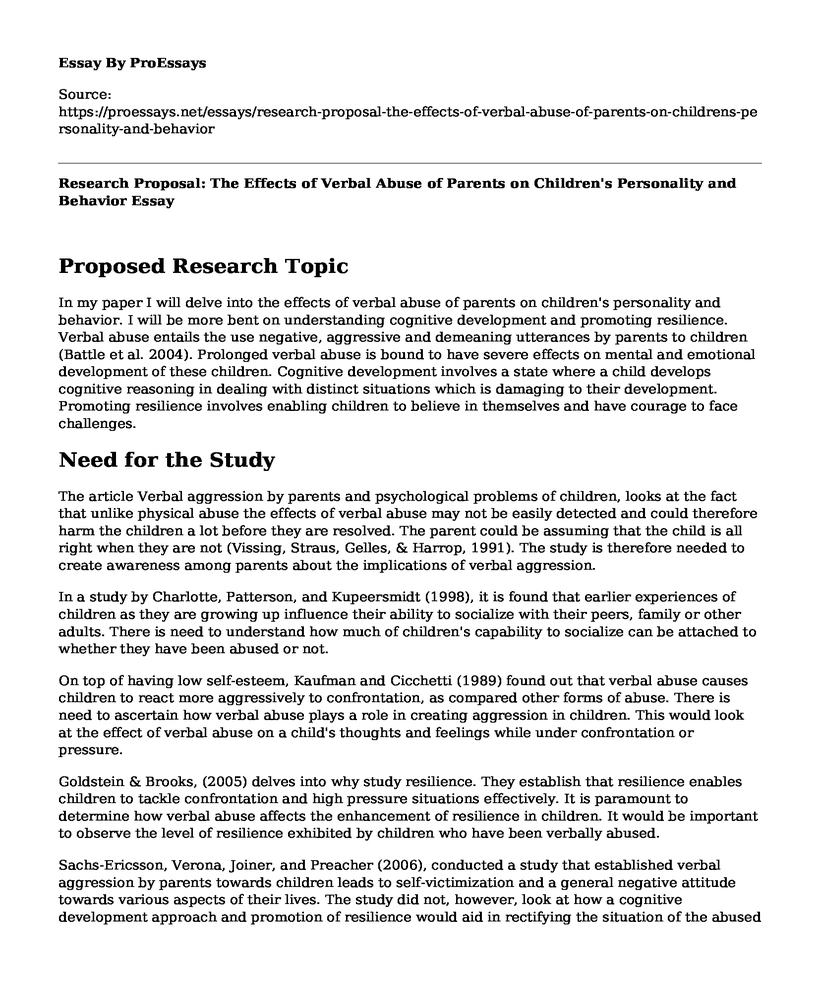Proposed Research Topic
In my paper I will delve into the effects of verbal abuse of parents on children's personality and behavior. I will be more bent on understanding cognitive development and promoting resilience. Verbal abuse entails the use negative, aggressive and demeaning utterances by parents to children (Battle et al. 2004). Prolonged verbal abuse is bound to have severe effects on mental and emotional development of these children. Cognitive development involves a state where a child develops cognitive reasoning in dealing with distinct situations which is damaging to their development. Promoting resilience involves enabling children to believe in themselves and have courage to face challenges.
Need for the Study
The article Verbal aggression by parents and psychological problems of children, looks at the fact that unlike physical abuse the effects of verbal abuse may not be easily detected and could therefore harm the children a lot before they are resolved. The parent could be assuming that the child is all right when they are not (Vissing, Straus, Gelles, & Harrop, 1991). The study is therefore needed to create awareness among parents about the implications of verbal aggression.
In a study by Charlotte, Patterson, and Kupeersmidt (1998), it is found that earlier experiences of children as they are growing up influence their ability to socialize with their peers, family or other adults. There is need to understand how much of children's capability to socialize can be attached to whether they have been abused or not.
On top of having low self-esteem, Kaufman and Cicchetti (1989) found out that verbal abuse causes children to react more aggressively to confrontation, as compared other forms of abuse. There is need to ascertain how verbal abuse plays a role in creating aggression in children. This would look at the effect of verbal abuse on a child's thoughts and feelings while under confrontation or pressure.
Goldstein & Brooks, (2005) delves into why study resilience. They establish that resilience enables children to tackle confrontation and high pressure situations effectively. It is paramount to determine how verbal abuse affects the enhancement of resilience in children. It would be important to observe the level of resilience exhibited by children who have been verbally abused.
Sachs-Ericsson, Verona, Joiner, and Preacher (2006), conducted a study that established verbal aggression by parents towards children leads to self-victimization and a general negative attitude towards various aspects of their lives. The study did not, however, look at how a cognitive development approach and promotion of resilience would aid in rectifying the situation of the abused children.
Scientific Knowledge
This study will create an elaborate connection between verbal aggression of parents towards their children and the impacts on the children thereafter. This would provide a pathway of treating children suffering from the effects of verbal aggression. This could be achieved through counseling that would be based around the occurrences surrounding such children. The counselor would be able to address the child's reasoning and feeling and be able to help them.
Theoretical Foundations
A wide range of studies have been conducted and have shown that school-attending children are often exposed to abuse. Abuse is bound to have negative impacts on the growth and development of these children. The study addresses the connection between abuse and unexpected personalities and behavioral characteristics of children thereafter. Assumptions are widely made by parents that they are disciplining or motivating their children to live up to their expectations, but more often than not it takes away the children's natural path towards intelligence development into a withdrawn or vindictive state.
References
Battle, C. L., Shea, M. T., Johnson, D. M., Yen, S., Zlotnick, C., Zanarini, M. C., &McGlashan, T. H. (2004). Childhood maltreatment associated with adult personality disorders: findings from the Collaborative Longitudinal Personality Disorders Study.Journal of Personality Disorders, 18(2), 193-211.
Bolger, K. E., Patterson, C. J., & Kupersmidt, J. B. (1998). Peer relationships and self-esteem among children who have been maltreated. Child Development, 69(4), 1171-1197.
Goldstein, S., & Brooks, R. B. (2005). Resilience in children. New York: Springer.
Kaufman, J., & Cicchetti, D. (1989). Effects of maltreatment on school-age children's socioemotional development: Assessments in a day-camp setting. Developmental Psychology, 25(4), 516.
Sachs-Ericsson, N., Verona, E., Joiner, T., & Preacher, K. J. (2006). Parental verbal abuse and the mediating role of self-criticism in adult internalizing disorders. Journal of Affective Disorders, 93(1), 71-78.
Vissing, Y. M., Straus, M. A., Gelles, R. J., & Harrop, J. W. (1991). Verbal aggression by parents and psychosocial problems of children. Child Abuse & Neglect, 15(3), 223-238.
Cite this page
Research Proposal: The Effects of Verbal Abuse of Parents on Children's Personality and Behavior. (2021, Apr 15). Retrieved from https://proessays.net/essays/research-proposal-the-effects-of-verbal-abuse-of-parents-on-childrens-personality-and-behavior
If you are the original author of this essay and no longer wish to have it published on the ProEssays website, please click below to request its removal:
- Drug and Substance Abuse Among Teenagers - Essay on Social Problem
- Abortion and Mental Health in Women Essay
- Columbine High School Massacre in Marilyn Manson's Song Essay Example
- Animal Zoos Argumentative Essay Example
- Position of Women in the Ecclesiastical Office Paper Example
- Essay Example on Bipolar I Disorder: A Global Mental Health Crisis
- Report Sample on Black Securing Housing Movement







